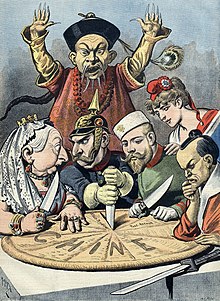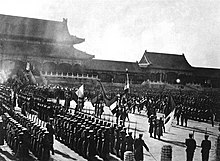China


In China, the term "unequal treaty" first came into use in the early 1920s to describe the historical treaties, still imposed on the then-Republic of China, that were signed through the period of time which the American sinologist John K. Fairbank characterized as the "treaty century" which began in the 1840s.[3] The term was popularized by Sun Yat-sen.[4]: 53
In assessing the term's usage in rhetorical discourse since the early 20th century, American historian Dong Wang notes that "while the phrase has long been widely used, it nevertheless lacks a clear and unambiguous meaning" and that there is "no agreement about the actual number of treaties signed between China and foreign countries that should be counted as unequal."[3] However, within the scope of Chinese historiographical scholarship, the phrase has typically been defined to refer to the many cases in which China was effectively forced to pay large amounts of financial reparations, open up ports for trade, cede or lease territories (such as Outer Manchuria and Outer Northwest China (including Zhetysu) to the Russian Empire, Hong Kong and Weihaiwei to the United Kingdom, Guangzhouwan to France, Kwantung Leased Territory and Taiwan to the Empire of Japan, the Jiaozhou Bay concession to the German Empire and concession territory in Tientsin, Shamian, Hankou, Shanghai etc.), and make various other concessions of sovereignty to foreign spheres of influence, following military threats.[5]
The Chinese-American sinologist Immanuel Hsu states that the Chinese viewed the treaties they signed with Western powers and Russia as unequal "because they were not negotiated by nations treating each other as equals but were imposed on China after a war, and because they encroached upon China's sovereign rights ... which reduced her to semicolonial status".[6]
The earliest treaty later referred to as "unequal" was the 1841 Convention of Chuenpi negotiations during the First Opium War. The first treaty between China and the United Kingdom termed "unequal" was the Treaty of Nanjing in 1842.[5]
Following Qing China's defeat, treaties with Britain opened up five ports to foreign trade, while also allowing foreign missionaries, at least in theory, to reside within China. Foreign residents in the port cities were afforded trials by their own consular authorities rather than the Chinese legal system, a concept termed extraterritoriality.[5] Under the treaties, the UK and the US established the British Supreme Court for China and Japan and United States Court for China in Shanghai.
Chinese post-World War I resentment
After World War I, patriotic consciousness in China focused on the treaties, which now became widely known as "unequal treaties." The Nationalist Party and the Communist Party competed to convince the public that their approach would be more effective.[5] Germany was forced to terminate its rights, the Soviet Union surrendered them, and the United States organized the Washington Conference to negotiate them.[7]
After Chiang Kai-shek declared a new national government in 1927, the Western powers quickly offered diplomatic recognition, arousing anxiety in Japan.[7] The new government declared to the Great Powers that China had been exploited for decades under unequal treaties, and that the time for such treaties was over, demanding they renegotiate all of them on equal terms.[8]
Towards the end of the unequal treaties
After the Boxer Rebellion and the signing of the Anglo-Japanese Alliance of 1902, Germany began to reassess its policy approach towards China. In 1907 Germany suggested a trilateral German-Chinese-American agreement that never materialised. Thus China entered the new era of ending unequal treaties on March 14, 1917, when it broke off diplomatic relations with Germany, thereby terminating the concessions it had given that country, with China declaring war on Germany on August 17, 1917.[9]
As World War I commenced, these acts voided the unequal treaty of 1861, resulting in the reinstatement of Chinese control on the concessions of Tianjin and Hankou to China. In 1919, the post-war peace negotiations failed to return the territories in Shandong, previously under German colonial control, back to the Republic of China. After it was determined that the Japanese forces occupying those territories since 1914 would be allowed to retain them under the Treaty of Versailles, the Chinese delegate Wellington Koo refused to sign the peace agreement, with China being the only conference member to boycott the signing ceremony. Widely perceived in China as a betrayal of the country's wartime contributions by the other conference members, the domestic backlash following the failure to restore Shandong would cause the collapse of the cabinet of the Duan Qirui government and lead to the May 4th movement.[10][11]
On May 20, 1921, China secured with the German-Chinese peace treaty (Deutsch-chinesischer Vertrag zur Wiederherstellung des Friedenszustandes) a diplomatic accord which was considered the first equal treaty between China and a European nation.[9]
Many of the other treaties China considers unequal were repealed during the Second Sino-Japanese War, which started in 1937 and merged into the larger context of World War II. Entering the war with the Attack on Pearl Harbor, China became a major ally in the war effort and the United States Congress was pressed to end American extraterritoriality in December 1943. Significant examples outlasted World War II: treaties regarding Hong Kong remained in place until Hong Kong's 1997 handover, though in 1969, to improve Sino-Soviet relations in the wake of military skirmishes along their border, the People's Republic of China was forced to reconfirm the 1858 Treaty of Aigun and 1860 Treaty of Peking.[citation needed]